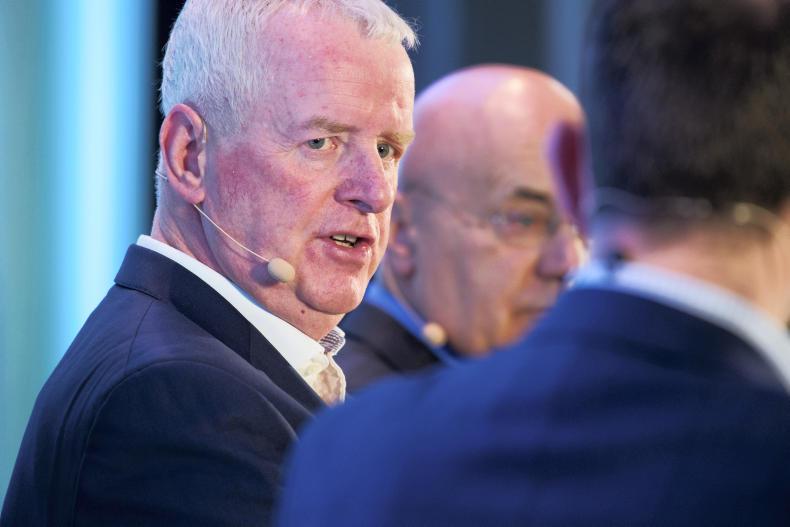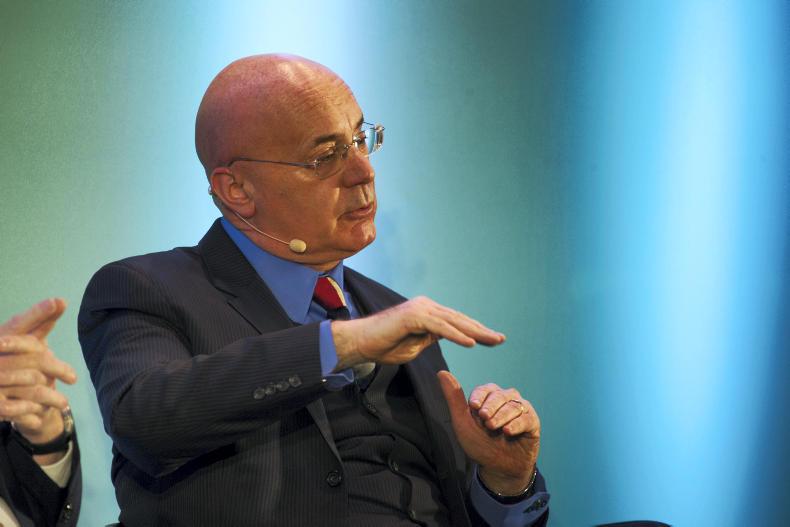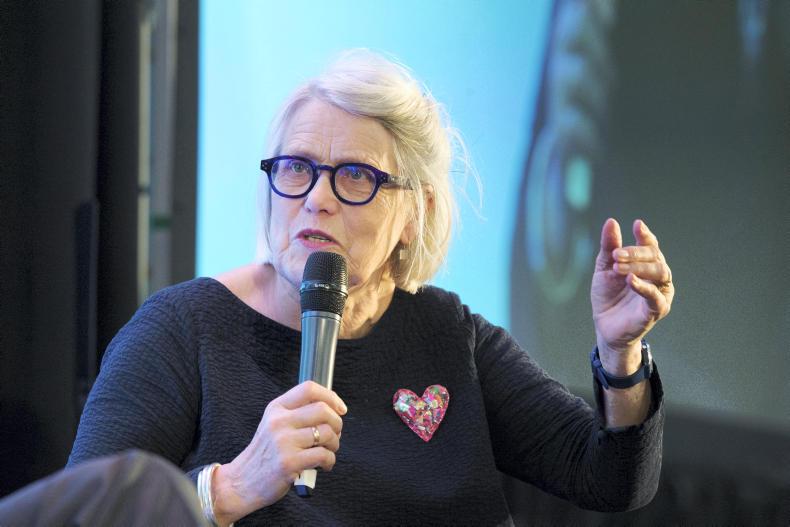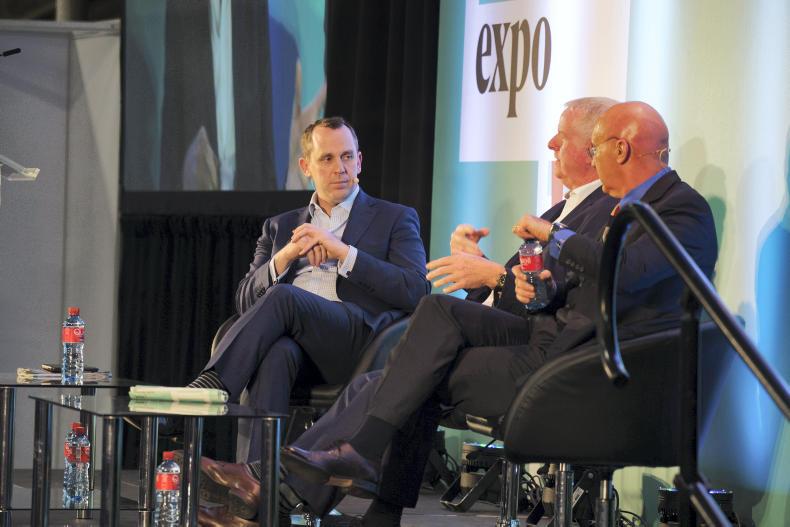“Desperation is a fantastic thing,” Darina Allen of Ballymaloe Cookery School told the Agri Careers Expo on Thursday.
All three speakers on the Masters of Motivation panel (Allen, John Moloney and Frank Murphy) achieved extraordinary success in their careers despite overwhelming setbacks in the late 1970s and early 1980s.

John Moloney (Former CEO, Glanbia). \ Barry Cronin
John Moloney had his heart set on veterinary, but missed out “by a lot” of points.
Instead, he went to UCD at 16 years of age to study agricultural science.
He failed everything in first year and took a year out to work in a warehouse in Smithfield in Dublin, during which time he “took stock”.
He repeated his exams and came out in the top third of the class.
Trainee
As a graduate, Moloney spent three weeks as an agricultural advisor and decided that was not for him.
So he went to Meadow Meats as a management trainee “which went swimmingly until it burnt down”.
So he was laid off just six months after getting married and he had a mortgage with 16% interest to pay.
“The early 80s were a difficult time,” Moloney said.
“You get up and move on. If you fail to move on, you get lost in self-analysis.”
He went on to do an MBA in UCG and joined Waterford Co-op as a public development officer in 1988.
Ultimately, he went on to become the CEO of Glanbia.
“It is crucially important to keep building your skills because of the pace of change,” he advised.
“A few years into the dairy industry, I did a diploma in project management.
"I encourage a lot of people to think of project management as a disciplined skill to get really good execution of a plan.”

Frank Murphy (Monex) \ Barry Cronin
Frank Murphy said he is a farmer at heart, but didn’t own land so did a bachelor of commerce in University College Cork.
He said he hated accounting, but got involved in agriculture in the company he was with and then moved into foreign exchange 30 years ago.
Two decades ago, he set up his company Monex, which now has a turnover of €100m a year and employs 160 people locally in Co Kerry.
“My advice to young people is to travel; Asia and South America,” he said. “Try to pick up a job that goes some place.”

Darina Allen (Ballymaloe Cookery School) / Barry Cronin
Darina Allen said that the cookery school in Ballymaloe, east Cork, was born out of desperation.
“In the 70s and 80s, we were getting less and less for our produce and we had four small children at the time. The writing was on the wall,” she said of their 100 acres of horticulture.
“My husband came home from the wholesalers in Cork one day after getting up at 6am to pick lettuces and said ‘I don’t care if I have to crawl on my knees I’m not going to do that again'."
Allen said they had to look hard at their own talents, resources and the possibility that they could lose the roof over their heads.
They wanted to live on the land, not to commute to the nearest city.
“I could cook a little, I had a degree in hospitality, Ballymaloe House was already established, so we decided to open a cookery school.”
Within two years, people were coming from abroad and there are 55 people on the payroll there today.
The three panellists agreed that the setbacks in their careers created opportunity for them.
For their employees, wage is an important motivator, but the little things like remembering birthdays, travel perks and a progression ladder are key to employee fulfilment.
Read more
Agri Careers Expo: top tips for making a career change
Agri Careers: Chinese and Spanish are the languages of the future
“Desperation is a fantastic thing,” Darina Allen of Ballymaloe Cookery School told the Agri Careers Expo on Thursday.
All three speakers on the Masters of Motivation panel (Allen, John Moloney and Frank Murphy) achieved extraordinary success in their careers despite overwhelming setbacks in the late 1970s and early 1980s.

John Moloney (Former CEO, Glanbia). \ Barry Cronin
John Moloney had his heart set on veterinary, but missed out “by a lot” of points.
Instead, he went to UCD at 16 years of age to study agricultural science.
He failed everything in first year and took a year out to work in a warehouse in Smithfield in Dublin, during which time he “took stock”.
He repeated his exams and came out in the top third of the class.
Trainee
As a graduate, Moloney spent three weeks as an agricultural advisor and decided that was not for him.
So he went to Meadow Meats as a management trainee “which went swimmingly until it burnt down”.
So he was laid off just six months after getting married and he had a mortgage with 16% interest to pay.
“The early 80s were a difficult time,” Moloney said.
“You get up and move on. If you fail to move on, you get lost in self-analysis.”
He went on to do an MBA in UCG and joined Waterford Co-op as a public development officer in 1988.
Ultimately, he went on to become the CEO of Glanbia.
“It is crucially important to keep building your skills because of the pace of change,” he advised.
“A few years into the dairy industry, I did a diploma in project management.
"I encourage a lot of people to think of project management as a disciplined skill to get really good execution of a plan.”

Frank Murphy (Monex) \ Barry Cronin
Frank Murphy said he is a farmer at heart, but didn’t own land so did a bachelor of commerce in University College Cork.
He said he hated accounting, but got involved in agriculture in the company he was with and then moved into foreign exchange 30 years ago.
Two decades ago, he set up his company Monex, which now has a turnover of €100m a year and employs 160 people locally in Co Kerry.
“My advice to young people is to travel; Asia and South America,” he said. “Try to pick up a job that goes some place.”

Darina Allen (Ballymaloe Cookery School) / Barry Cronin
Darina Allen said that the cookery school in Ballymaloe, east Cork, was born out of desperation.
“In the 70s and 80s, we were getting less and less for our produce and we had four small children at the time. The writing was on the wall,” she said of their 100 acres of horticulture.
“My husband came home from the wholesalers in Cork one day after getting up at 6am to pick lettuces and said ‘I don’t care if I have to crawl on my knees I’m not going to do that again'."
Allen said they had to look hard at their own talents, resources and the possibility that they could lose the roof over their heads.
They wanted to live on the land, not to commute to the nearest city.
“I could cook a little, I had a degree in hospitality, Ballymaloe House was already established, so we decided to open a cookery school.”
Within two years, people were coming from abroad and there are 55 people on the payroll there today.
The three panellists agreed that the setbacks in their careers created opportunity for them.
For their employees, wage is an important motivator, but the little things like remembering birthdays, travel perks and a progression ladder are key to employee fulfilment.
Read more
Agri Careers Expo: top tips for making a career change
Agri Careers: Chinese and Spanish are the languages of the future















SHARING OPTIONS